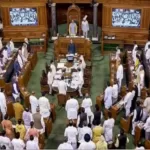Gilgit-Baltistan, a region in Pakistan-occupied-Kashmir (PoK), has become a focal point of attention due to a series of anti-Pakistan protests. Reports have emerged concerning a viral video circulating on the social media platform X (formerly Twitter), depicting locals amassing in Skardu to voice their dissatisfaction with the Pakistani government. The protesters are demanding the immediate release of their leaders and have even issued threats of “civil war” and potential “merger with India” if their demands remain unmet.
The video capturing these events purportedly features a local leader addressing a sizable crowd near a mosque within the city. The leader’s words resonate with intensity as he expresses that unless Pakistan releases the detained leaders of the region and halts their arrests, the protesters will not hesitate to “break down the doors to Kargil.” This statement has been interpreted as a stark threat to align with India. Additionally, the protesters effectively blocked the Karakoram highway, further accentuating the extent of their grievances.
The video footage is replete with fervent slogans and declarations of fearlessness. Amidst the spirited atmosphere, the leader firmly proclaims, “We will go to Kargil, and no one will be able to stop us,” eliciting cheers from the passionate crowd.
In a post shared on August 29, 2023, on Twitter by user Rishi Bagree (@rishibagree), the video captured the palpable sentiment of defiance within the local populace. The footage shows the demonstrators vowing to take action unless their leaders are promptly released.
𝐏𝐑𝐎𝐓𝐄𝐒𝐓𝐒 𝐈𝐍 𝐒𝐊𝐀𝐑𝐃𝐔 𝐓𝐎 𝐌𝐄𝐑𝐆𝐄 𝐆𝐈𝐋𝐆𝐈𝐓 𝐁𝐀𝐋𝐓𝐈𝐒𝐓𝐀𝐍 𝐖𝐈𝐓𝐇 𝐈𝐍𝐃𝐈𝐀
Protests in #Skardu have turned violent.Local population has threatened #Pakistan Govt to immediately release their leaders or they will rage a civil war & merge with #India
1/2 pic.twitter.com/rb4jA4faZy— Nepal Correspondence (@NepCorres) August 29, 2023
Echoing the sentiment of many, the leader in the video denounces the presence of “terrorists” and questions the motivations behind their provocation, particularly with regard to their connection to the allegations that have surfaced.
Multiple sources indicate that an FIR has been lodged against Sheikh Bakir al-Husseini, a Shia Muslim cleric, under the blasphemy law. The situation has stirred unrest among the people of Skardu, intensified by the perceived tightening of the blasphemy law.
Reports suggest that the protests have not been confined to just vocal expressions of discontent. Demonstrators have effectively disrupted traffic flow, underscoring the depth of their frustration. A prevailing notion among the protesters is that the army and the intelligence agency ISI are instigating tensions within the region by exploiting sectarian divisions.
What is particularly striking is the transformation in public discourse. Views that were once regarded as blasphemous have now found open expression. The notion of reuniting with India, which was once considered sacrilegious, has now become a rallying cry among the disenchanted locals.
Wazir Hasnain, a social worker within the Gilgit-Baltistan region, reflects the collective sentiment with his statement: “If you give us pain, we will give you double the pain. There is no peace now. Peace will come when our lives will be secured. If we are not safe, no one else will be spared.” Hasnain underscores the protesters’ determination to continue their stance until their demands are acknowledged by the government officials who have ignited their fervor.
These events shine a light on the deep-seated discontent within the region and underline the complexity of the dynamics at play, intertwining politics, religion, and geopolitical aspirations.



